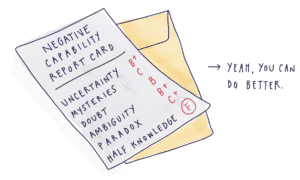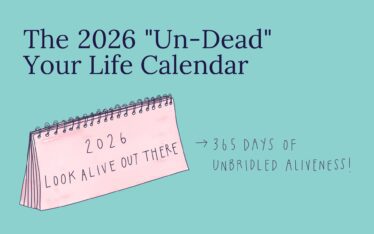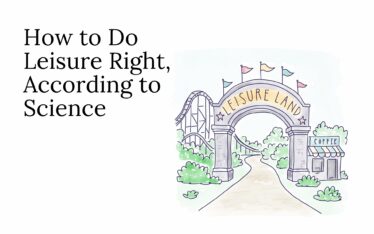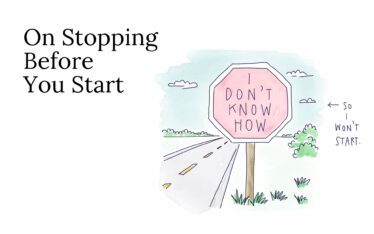I think I know you well, friend. Let me guess: You like certainty. You like “to know.” You like clarity. You like it when things make sense. Am I like a 1-900 psychic or what? I nailed you, didn’t I?
The problem with all those things you love to like is that you live in a world of uncertainty, a world where you can’t always be in the know, a world where things can be as clear as mud, a world where things can be pretty non-sensical.
That doesn’t always sit well with us, does it?
So when I stumbled upon this idea of negative capability, I knew I had to kick it around and share it with you.
What is Negative Capability?
Negative capability is a notion first articulated by poet John Keats, who believed that a wise person is someone who “is capable of being in uncertainties, Mysteries, doubts, without any irritable reaching after fact & reason.” (I did not feel like a wise person after reading this. I was also curious why Keats chose to capitalize the word Mysteries, and didn’t like not knowing why, which proved that I have minus negative capability.)
Wait, what? Being okay with doubts? Not being bogged down by all that’s rational? Who can do that other than a long-since-dead Romantic English poet?
Academics have echoed this definition, saying that “negative capability indicates the capacity to live with and to tolerate ambiguity and paradox, to ‘remain content with half knowledge’ and, therefore, to engage in a non-defensive way with change, resisting the impulse merely to react to the pressures inherent in risk-taking.”
Wait, what? Being okay with ambiguity? Welcoming change with open arms? Who can do that in the 21st century?
And here is where our opportunity sits — waiting for us patiently, with its legs crossed, sipping a snifter of Cognac, with that “patience, grasshopper” look in its eyes. The opportunity is to maximize our negative capability, to loosen our death grip on our need to be in control. What might we have to gain by being okay with “half knowledge”?
Six ways to build Negative Capability
- Adopt a willingness to see murkiness as an adventure. Consciously choose this mindset and tattoo it on your forearm if you have to (or maybe just write it on a sticky note and put it beside your laptop). Most of us are clamoring for an adventure in our overworked lives, and we’re missing the point that uncertainty provides the grandest adventure out there. Not knowing what will happen with the “reimagining the org chart” initiative at your office? It’s an adventure! Not certain what’s going to happen with your fledging relationship? It’s an adventure! Believing you’ll be fine regardless of the outcome (because you will) can help with this little adventure perspective.
- Loosen your stranglehold grip on control. Relax! It’s all out of control anyways (like this too-cute bath mat will advise you daily). Control is elusive and slippery and tricky because we sometimes feel close to achieving it, usually for 15 minutes before the next email/ catastrophe/ customer request/ derailing moment occurs. Control is an illusion. We’re better off giving up the ghost than trying to catch it and lock it up in our little control cages. Expect and accept that gaining full control is fully out of your control, surrendering to doing your best with whatever information is available to you.
- Embrace the liminal space. Liminality is that fluid state of being or understanding… that no-man’s land that Keats referred to in his negative capability definition. Researchers note that a person “who believes they are capable of understanding new ideas (self-efficacy), who makes positive attributions in relation to their potential for success (optimism), who can monitor and re-align goals and the pathways to attaining these goals (hope) and who does not give up in spite of the difficulties they encounter with the new knowledge (resilience) may be able to cope with liminality more effectively than those who lack these affective assets.” Sounds like a recipe to me: a dash of self-efficacy, a sprinkle of optimism, a tablespoon of hope, and maybe a shit-ton of resilience.
- Keeping an open mind keeps you… open. Thanks, Captain Obvious! Open is almost always better than closed (except with tent flaps — close those puppies TIGHT). Unclench your jaw and feel how luxurious the willingness to wonder really is. Ask yourself such gems as, “What could happen here if I got curious?”, “How might I be okay with all that’s possible?”, “What’s the benefit of not knowing right now?”, “What’s behind my death grip on needing to know? Is it my ego again?”, and perhaps most important of all, “What’s for dessert tonight?” (remaining open to whether it’s Chunky Monkey or Cherry Garcia ice cream… live in the liminal space of not knowing!).
- Suspend your need for super-speedy solutions. Most of the leaders I work with have been well trained to make decisions PRONTO, to take action yesterday instead of waiting until tomorrow. I’m a fan of action too, but maybe pausing could serve us well from time to time. Maybe waiting a beat for inspiration… gathering a fresh perspective from that new guy in accounting… being on the lookout for creative options… going for a workout to refresh the way you’ve been tackling the problem… actually paying attention to your intuition for a change… letting it all breathe, like a good wine… might these things lead to even better decisions?
- Consider your appetite for serendipity. Are you “arms wide open” for fabulous things to occur, even in the midst of tumultuousness? Are you willing to get curious about what might emerge from the rubble of plans that didn’t pan out? Are you okay to simmer in the Mystery of it all (WHY THE CAPITAL M, JOHN, WHY?!).
The more we talk about this here (in my imaginary two-way conversation with you, where we’re sitting by the pool together), the more I realize that building negative capability isn’t as much of an interesting option worth exploring, but rather a required skill for survival on our planet (if we want to be even a tiny bit happy).
 We live amidst a cacophony of not knowing. We make our ways through days of guaranteed unsure-ness. We don’t even know how much time we have left to live (you know I had to bring in the Grim Reaper here), so our existence is rooted in the grandest “who the fuck knows?” question of all. We’re destined to not know, to live our lives in no man’s land… so why not get good at it? Or at the very least not suck at it? I’m going to re-read my six pieces of advice and try to practice what I preach. In the meantime… cheers to the liminal Mystery of it all! (And Cherry Garcia.)
We live amidst a cacophony of not knowing. We make our ways through days of guaranteed unsure-ness. We don’t even know how much time we have left to live (you know I had to bring in the Grim Reaper here), so our existence is rooted in the grandest “who the fuck knows?” question of all. We’re destined to not know, to live our lives in no man’s land… so why not get good at it? Or at the very least not suck at it? I’m going to re-read my six pieces of advice and try to practice what I preach. In the meantime… cheers to the liminal Mystery of it all! (And Cherry Garcia.)

Oh and just in case you missed it… please take 16 minutes out of your life to watch my TEDx talk!






